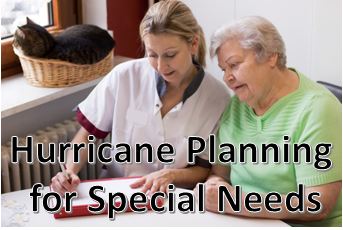In New Orleans, people aged 60 and older comprised 15 percent of the population prior to Hurricane Katrina. However, more than 70 percent of those who died as a result of the hurricane were elderly (Grantmakers in Aging). Data from the Louisiana Department of Health show that almost 70 nursing home residents died in their facilities.
The experiences from such disasters have caused emergency, healthcare and eldercare professionals to rethink hurricane planning for special needs. As your Florida eldercare experts, we will share some tips from our process and provide valuable resources and information you need to know.
The Process of Hurricane Planning for Special Needs
Our team is here to help you with better hurricane planning for special needs! We go through an individualized process with clients to: 1. assess their situation (personal/ability to self-preserve, support network, and home readiness), 2. set up possible options for sheltering at home, evacuating or alternative stays, and 3. put together supplies and prepare for the season. Then, when a storm approaches we can help the client put the plans into place according to the preparations that have been done and the forecast, as well as to check on the supplies and details.
Here are some key tips from our hurricane planning for special needs process:
- Assess the individual situation: consider health condition, ADL/IADL needs, mobility, dependence on medications and services, memory problems, etc. Assess the home’s readiness and location (those in flood zones or living in a mobile home will not be able to shelter in place). Assume services and access to supplies may be interrupted for as long as a few weeks.
- Assess the support network and options. What services do you rely on and what are their emergency plans? How can neighbors, friends, and family members help (can any offer safer locations for evacuating and/or help during and after the storm–be realistic here)?
- Most people should have a few options depending on the specific emergency, ranging from sheltering in place to a host home or assisted living respite stay to the special needs shelter as a backup. For many clients we work with, a respite stay at an assisted living or nursing facility makes sense during/after the storm as they can be in a safe environment with relative comfort and support staff. We help clients find an appropriate place, complete paperwork, arrange transportation, pack for their stay and communicate with all parties.
- Special needs shelters should not be your primary plan for dealing with storms. Read about what to expect from special needs shelters and what you need to know.
- Prepare supplies for the various options. Supplies are needed whether sheltering in place (Broward County has a nice shopping list, which helps you prepare by buying things over a period of weeks) or evacuating. Throughout hurricane season, these supplies should be ready, especially medications.
- Prepare key information: list of contacts, medical history, list of medications, insurance paperwork/contacts, etc. Place documents in a waterproof container that you can “grab and go”.








